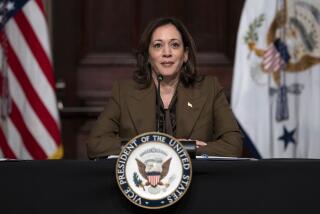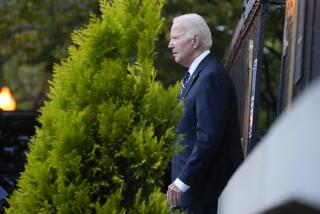Irked Shultz Told to Keep Silent on Iran Connection : But Speakes Denies He Is Muzzled
- Share via
SHANNON, Ireland — Secretary of State George P. Shultz said today the White House has issued an order that only it is authorized to answer questions about U.S. negotiations with Iran on freeing American hostages in Lebanon and “I don’t particularly enjoy it.”
He also said that not negotiating with terrorists is the right policy for the United States, but he refused to say if that policy was abandoned in seeking the release of U.S. hostages in Lebanon.
“The White House is in charge of the executive branch and they have issued a statement that all statements will be handled by the White House and that’s why I cannot comment,” Shultz told reporters on his Air Force plane as he returned to Washington.
‘His Own Decision’
In Washington, presidential spokesman Larry Speakes denied Shultz had been muzzled by the White House. Speakes said “it was his own decision. . . . He referred all questions on this to the White House and we did not tell him to do that.”
He said Shultz had been “involved . . . from the outset” in U.S. policies on Iran.
Shultz was returning home from talks in Paris with French officials on terrorism and a failed meeting in Vienna with Soviet Foreign Minister Eduard A. Shevardnadze on arms control.
Reports of a clandestine White House program to get military equipment to Iran shadowed Shultz on his way home.
Report by Iranian
Iran’s Parliament Speaker, Hashemi Rafsanjani, said Tuesday that a U.S. delegation secretly visited Iran recently to seek improved relations, and U.S. reports have said the United States and Israel have shipped weapons and military parts to Iran to win the release of Americans kidnaped in Lebanon.
“I am not going to comment on that,” Shultz said in an airborne news conference before stopping in Shannon to have his jet refueled.
The Los Angeles Times has reported that Shultz protested to President Reagan that shipping arms to Iran contradicted U.S. policy. The White House has not acknowledged such shipments.
Maintaining an almost solid wall of silence apparently bothered Shultz. “I don’t particularly enjoy it,” he said. “I like to say what I think.”
‘The Right Policy’
As he parried reporters’ questions, Shultz said, “The policy of not negotiating--for us is the right policy.”
But he added, “I’m not going to get drawn into the thing.”
Longstanding U.S. policy has ruled out negotiating with those who hold Americans hostage or with countries that sponsor the captors. The State Department has said only that a dialogue about the hostages’ well-being is permissible.
At the White House, Speakes heatedly declined to comment on reports of an Iranian connection.
Speakes--at one point pounding the lectern in the White House briefing room--said, “We will provide a strict no comment to all questions.
‘No Comment, Period’
“All reporting on this subject is very, very, very harmful. . . . Actions are being called into question by those who don’t know what they’re talking about. We will provide no comment, period. No comment, no comment, no comment, sorry.”
Speakes said “what we have done and what we will do” was aimed at freeing American hostages and added, “Whatever we’ve done is legal and whatever we will do is legal.”
Asked to justify the White House’s silence on the issue when its own National Security Council appeared to be operating the hostage release strategy, Speakes replied, “That’s true and we’re not commenting.”
Speakes said President Reagan was upset by the leaks.
Pressed on why the White House did not want to set the record straight, he replied, “Our credibility is entirely credible . . . . If there’s any problem there we can bear that because we have lives at stake here.”
More to Read
Sign up for Essential California
The most important California stories and recommendations in your inbox every morning.
You may occasionally receive promotional content from the Los Angeles Times.










